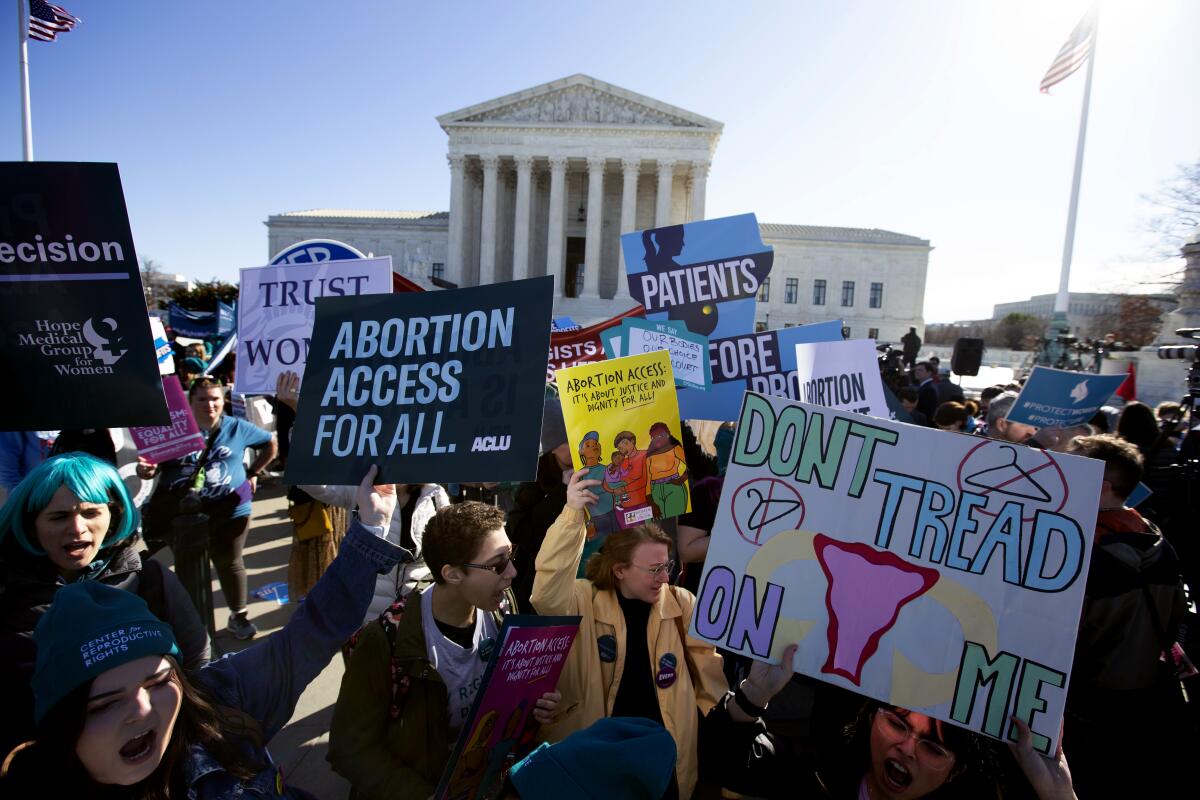Editorial: The right to an abortion means the right to have it for any reason

- Share via
A constitutional right to an abortion means a right to have one for any reason. That should also mean a woman can elect to tell her doctor — or not — why she wants an abortion.
But that’s not what is happening in Ohio, where the state Legislature in 2017 passed a ban on doctors performing abortions when they know the woman is seeking one because her fetus has been diagnosed with Down syndrome or is suspected of having it. The law also made it a felony for doctors to defy the law.
That measure is just one of hundreds of unjustified restrictions that state legislatures have passed in the last decade to curtail a woman’s right to an abortion up to the point when a fetus is viable outside a woman’s body (roughly 24 weeks into a pregnancy). The Supreme Court guaranteed that right nearly 50 years ago in the landmark case of Roe vs. Wade and has upheld it multiple times since then.
Any restriction that makes it overly difficult to get an abortion or conflicts with the right to obtain one — such as limiting abortions to the first eight to 10 weeks of pregnancy — is typically blocked by the courts. And the recent passel of laws that bar women from having an abortion for certain reasons — for example, to select the child’s gender or to avoid a genetic anomaly like Down syndrome — have often been blocked by courts as well.
That’s what initially happened with the Ohio law. A federal judge issued a preliminary injunction after lawyers for several medical service providers and a doctor in Ohio sued the state. But in a troubling decision, the U.S. Court of Appeals for the Sixth Circuit overturned the lower court’s order and removed the injunction this week, allowing the law to go into effect.
Writing the lead opinion for a fractured court, Circuit Court Judge Alice M. Batchelder said the law neither bans a woman from seeking an abortion for a fetus diagnosed with Down syndrome nor poses a burden that interferes with her getting the abortion. Why? Because the woman doesn’t have to tell the doctor performing the abortion that she wants the abortion for that reason. In Batchelder’s view the law is there only to stop doctors in the state from knowingly performing abortions on fetuses with Down syndrome. If the doctors don’t know about the fetus’ diagnosis, Batchelder reasoned, they aren’t discriminating against the Down syndrome community.
But in fact, all the state has done is discriminated against the women who want to have a frank discussion with their doctors about whether they want to give birth to a baby that is expected to have Down syndrome. The court admits it’s the woman’s right to have the abortion for whatever reason. But by keeping mum about her motives, the judges argue, the woman relieves some of the stigma about Down syndrome.
As Judge Jeffrey Sutton put it in a concurring opinion, “The Ohio law makes the decision a private one — and leaves it there, perhaps just where it should be left. At the same time, it prevents the medical profession in particular and society in general from knowingly casting aspersions on individuals with Down syndrome — or, worst of all, celebrating the number of Down syndrome births averted.”
That’s just loopy. It’s the abortion patient’s equivalent of “Don’t ask, don’t tell.”
And that helps no one; worse, it may be counterproductive. It certainly doesn’t help people living with Down syndrome who rightly need to be protected against discrimination at school and work. And did it occur to state legislators and the appellate judges that the more deeply and candidly a woman can discuss her options and possible decision with her doctor — who may also be the one performing the abortion — the more information she may get about Down syndrome, which could help to overcome the stigma the law cites?
But at the end of the day, it is still an unconstitutional ban on abortion, as Judge Bernice Bouie Donald points out in her dissent: “Ohio would have us believe that such a ban is constitutionally acceptable, as long as the law does not affect other women with other reasons for seeking an abortion. In other words, ‘It does not ban many women, so it is not a ban.’ As 18 constitutional law scholars point out in an amicus brief: ‘That is nonsense.’ A ban on any particular abortion is just that: a ban. It does not matter that not every abortion is banned; rather, it matters that the law bans any woman from choosing an abortion.”
The Supreme Court evidently needs to underline a point that should have already been clear: No matter what lawmakers may think about a woman’s reasons for obtaining an abortion, those reasons don’t matter.
More to Read
A cure for the common opinion
Get thought-provoking perspectives with our weekly newsletter.
You may occasionally receive promotional content from the Los Angeles Times.










